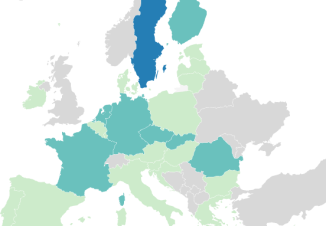
In the recent Jessica Porras case (C-103/16, 22 February 2018), the European Court of Justice answered five questions relating to the dismissal of a pregnant employee in the context of a collective redundancy scheme raised by the High Court of Justice of Catalonia.
Mrs Porras was notified of her dismissal by the Spanish bank, Bankia, by letter in accordance with the agreement drawn up by the special negotiating body. She challenged her dismissal before a Barcelona employment court, which ruled in favour of Bankia. In an appeal before the High Court of Justice of Catalonia, the Court asked the European Court of Justice for guidance on the interpretation of the prohibition on dismissing pregnant employees in Directive 92/85 on the safety and health at work of pregnant workers and on the meaning of Directive 98/59 on collective redundancies.
Directive 92/85 aims at protecting pregnant workers, considering them ‘especially sensitive workers’, since being dismissed on grounds connected with their condition may give rise to harmful consequences for their physical and mental state. Additionally, the Directive states Member States must take all necessary measures to prohibit the dismissal of female workers between the beginning of pregnancy and the end of maternity leave. However, dismissal may be permitted in exceptional cases when pregnant employees are dismissed for reasons unrelated to their condition.
Directive 98/59 collates the legislation of Member States, setting minimum conditions with regard to collective dismissals. Article 51 of the Spanish Statute of Workers sets out the procedure to be followed for a collective dismissal and, taken in conjunction with procedural labour Law 36/2011, of 10 October 2011, the dismissal of any pregnant worker will be regarded as void. However, according to Royal Decree 1483/2012 of 29 October 2012, only workers’ legal representatives are protected from being included in a collective dismissal.
In considering the interplay of Spanish national legislation with these Directives, the High Court of Justice of Catalonia decided to ask the European Court of Justice five questions, as detailed below.
First Question
As described above, Directive 92/85 establishes an obligation for Member States to prohibit the dismissal of pregnant women, women who have given birth or who are breastfeeding. These employees can only be dismissed in exceptional situations where the dismissal is not related to circumstances inherent to the worker’s condition. By contrast, Directive 98/59 also contains an exception permitting dismissal, but uses the expression ‘one or several reasons not inherent to the person of the workers’.
The High Court of Justice of Catalonia asked the European Court of Justice whether these Directives were contradictory, since the exceptional cases are more restrictive in one Directive than the other. The European Court of Justice held that the pregnant worker belonged both to the group of workers protected by Directive 92/85 and to the group protected by Directive 98/59. Since she was pregnant, she must be protected simultaneously by the rights established in both Directives.
Once the combined application of both Directives was established, the High Court of Justice of Catalonia asked the European Court of Justice whether Directive 92/85 prohibiting the dismissal of pregnant women, women who have given birth or who are breastfeeding, contradicts national regulations that allow for the dismissal of pregnant workers in the course of a collective dismissal.
The European Court of Justice stated that the prohibition on dismissal established in Article 10 of the Directive is intended to avoid the harmful consequences that dismissal for reasons relating to their condition may have on the physical and mental health of a pregnant worker. Therefore, a dismissal decision affecting a pregnant worker but not based on reasons related to the pregnancy, will not be contrary to Article 10, since the dismissal is unrelated to the worker’s pregnancy.
Consequently, the European Court of Justice concluded that when collective dismissals are carried out, reasons ‘not inherent in the person of the workers’ within the meaning of Directive 98/59 do constitute exceptions to the prohibition on dismissal under Article 10 of Directive 92/85.
Second and Fourth Questions
Taken together, these questions asked whether Spanish national legislation which does not give protected or priority status to be retained or redeployed to pregnant workers and workers who have given birth or are breastfeeding, is contrary to Directive 92/85, which establishes the need to take measures to prohibit the dismissal of these workers. The European Court of Justice held that Directive 92/85 does not preclude Spanish national legislation establishing priority status for certain workers, since it only contains minimum provisions. In any case, Directive 92/85 does not prevent Member States from guaranteeing greater protection to pregnant workers, workers who have given birth or who are breastfeeding.
Third Question
The third question asked whether Article 10 of Directive 92/85 overrides national legislation that does not prevent the dismissal of pregnant, post-partum or breastfeeding employees but only provides for that dismissal to be declared void after the fact if it is found unlawful. The European Court of Justice’s response has generated some controversy.
The European Court of Justice concluded that Directive 92/85 requires Member States to provide double protection: not only against the effects of dismissals in the form of reparation, but also preventive measures to avoid any potential damage to the physical and psychological condition of the pregnant employee. In this case, the European Court of Justice found that Spanish legislation did not provide this double protection, since preventive protection against dismissal is not guaranteed. For this reason, the Spanish national regulations are contrary to the provisions of the Directive.
Fifth Question
The fifth question asked whether national legislation allowing an employer to dismiss a pregnant worker within the framework of collective redundancy without communicating reasons other than those justifying the collective redundancy and without making any reference to the occurrence of an ‘exceptional case’ contravened Directive 92/85.
The European Court of Justice held that in order to comply with the Directive, an employer must provide justified reasons for dismissal in writing, justify that these reasons are not inherent to the person of the employee, and indicate to the employee what objective criteria will followed to designate workers to be included in the collective dismissal. As long as these requirements are met, Spanish regulations will not contravene the Directive.
Commentary
This judgment demonstrates that the European Court of Justice understands that a pregnant employee does not have priority status under Spanish regulations in a collective dismissal context, while employee representatives do. However, a brief comment on the European Court of Justice’s answer to third question must be added. The preventive measures the European Court of Justice claims Spanish regulations fail to provide are arguably present in Spain, since there are administrative economic fines when pregnant employees are dismissed based on the exercise of an employer´s discretion. The European Court of Justice also disregarded the additional compensation that is usually granted to pregnant employees who are dismissed. These measures should be enough to make an employer think twice before carrying out these kinds of dismissals.


